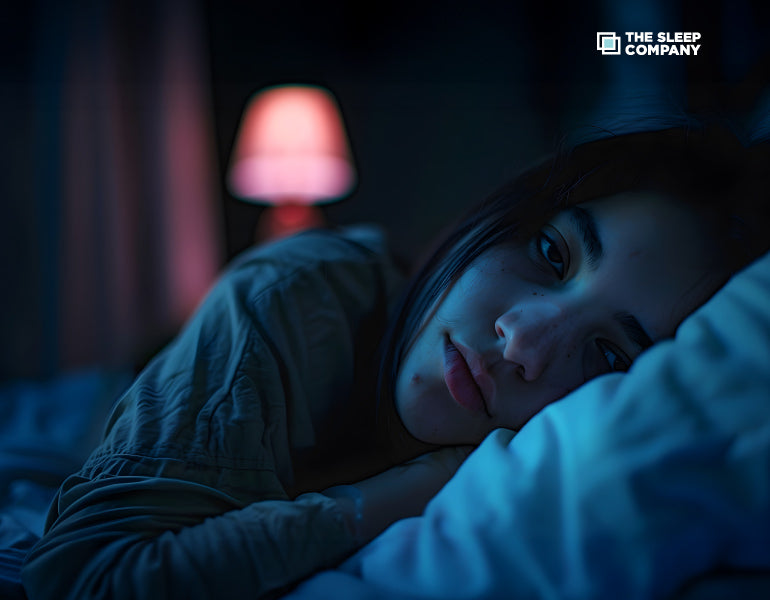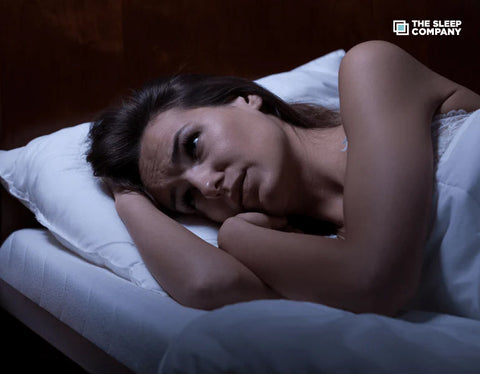My Cart

Sleep Disorders in Dementia- More Than Just Insomnia

Dementia is a medical condition where a person’s brain function becomes impaired. Here, they experience symptoms, such as memory loss, confusion, and more.
This condition can affect one’s daily functioning and at times, can feel difficult to cope with.
That said, disturbed sleep and sleep disorders are also common in people with dementia. And, it's never just limited to insomnia.
These sleep disturbances can accelerate or worsen one’s cognitive decline and can even cause physical health problems.
Therefore, it is crucial is to overcome sleep disorders, which can be done by understanding them better.
Ahead, we bring you all the information you need about sleep disorders in dementia.
Common Sleep Disorders in Dementia
Now, let’s take a look at some of the common sleep disorders that people with dementia suffer from.

1. Insomnia
Insomnia is a common sleep disorder in people with insomnia. Here, you have difficulty falling or staying asleep. Infact, insomnia symptoms also pose a risk factor for dementia as it can worsen memory loss, increase confusion, and even lead to mood swings. That's why it becomes crucial to manage sleep right from the start.
2. Sleep Apnea
Another common sleep disorder in people with dementia is Sleep Apnea. Here, your breathing repeatedly stops and starts during sleep.
In dementia patients, this condition can be especially problematic, as it leads to frequent sleep disturbances and poor sleep quality.
The lack of oxygen during these episodes can make one feel drowsy during the day. It also accelerates memory problems and even puts them at risk of heart issues.
3. Restless Legs Syndrome (RLS)
Restless Leg Syndrome or RLS is a sleep disorder where you feel this intense urge to move your legs. So, for people suffering from dementia, this condition can disrupt their sleep as it becomes difficult to stay or fall asleep.
For people with dementia suffering from RLS, it can lead to extreme fatigue in the mornings and can also worsen their cognitive symptoms.
4. REM Sleep Behavior Disorder (RBD)
REM Sleep Behavior Disorder or RBD is a condition where people act out in their sleep, sometimes even violently or aggressively. So, in people suffering from dementia, it not only interferes with their sleep but also leads to injuries.
People suffering from RBD tend to move a lot in their sleep as well.
5. Circadian Rhythm Disruptions
Circadian rhythm disruptions is a condition when your body's internal clock is out of sync. This can lead to confusion as to when to fall asleep and when to stay awake, especially in people with dementia. Here, it gets excessively difficult to maintain a regular sleep schedule.
Causes of Sleep Disorders in Dementia
While above we unpack a few common sleep disorders in people with dementia, now let’s understand their causes.

1. Changes In The Brain Function
For people suffering from dementia, their normal brain function gets disrupted. So, what happens is that it can affect their sleep and also make it difficult to fall or stay asleep.
2. Certain Medications
When one suffers from dementia, medications become a part of their routine. These medications can cause side effects in the form of sleep disorders.
3. Emotional Impact Of The Condition
Dementia can be difficult for the patients. Infact, it can have an emotional and psychological impact on them. It can cause agitation, anxiety, or even depression, and this can interfere with one's sleep.
4. Improper Sleep Environment
Sleep environment also plays a major role here. For instance, a lumpy mattress or too much noise can hamper sleep.
Management Strategies for Better Sleep for People with Dementia

Here are a few things one can do for better sleep when suffering from dementia.
1. Managing One’s Medications
As aforementioned, medications can be the cause of sleep disorders in patients with dementia. So, if the sleep disorders are fairly new and are especially experienced after changes in the current medication, it is best to speak with a healthcare provider for more information.
2. A Cozy Bedroom
Comfort is crucial for everyone when it comes to sleep.
So, for someone suffering from insomnia, creating a healthy and cozy sleep environment should be a priority.
For instance, this can include a medium-firm breathable mattress like the Smart Ortho mattress by The Sleep Company, blackout curtains, soft lighting, and more. You must also make sure that the temperature of the room is just right. That said, the sleep environment must align with their preferences and needs.
3. Light or Cognitive Therapy
Patients with dementia can try therapies like light therapy. This can reset the circadian rhythm, which, in turn, can help manage sleep. There is also cognitive behavioral therapy, which helps cultivate good sleep habits. For this, it is important to speak with your healthcare provider.
4. Changes In One’s Lifestyle
Make sure that the person with dementia consumes a healthy balanced diet. They must also limit their consumption of caffeine and completely avoid alcohol. Even in the evening, their meals must be light, and they must keep themselves hydrated throughout the day.
The Final Word
Dementia is a condition with no cure currently. However, there are several treatments that can help manage symptoms to a great extent. That said, sleep is always a crucial factor when it comes to anyone's overall well-being. It's the same for people with dementia.
A good night's rest helps them maintain their brain health and it can also play a major role in managing the symptoms.
Therefore, start by creating a comfortable sleep environment that suits their needs. It can be bringing home a comfortable Smart Ortho mattress by The Sleep Company or choosing blackout curtains to block excess light. This first step can go a long way!
FAQs
Sleep apnea and insomnia are two common sleep disorders linked with dementia. Therefore, it is extremely important to manage sleep disorders to further curb the symptoms of dementia. Otherwise, it can worsen the condition.
People with dementia have trouble sleeping because it can hamper the melatonin production. Melatonin is a sleep hormone that regulates sleep-wake cycle.
Sleep disturbances are fairly common in people with dementia. Studies show us that on average, about 26% of individuals with dementia living at home experience sleep disturbance symptoms.





























































